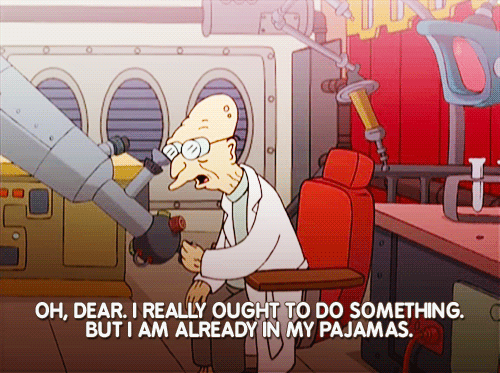When I've just gotten home from 109, and remember that I need to go back and check on something at my UROP
It felt like the experiments went by so much faster in 109, mostly because our wonderful lab instructors did so much behind-the-scenes work. But when running Northerns for my UROP, I actually had to do all the washes and strips and probing and more washes. Things that took us maybe 2 hours combined between a Friday and the next Wednesday, took me a 9-hour day in the lab and then an hour every day for five days after that for my UROP. It was incredibly frustrating in two ways. First of all, I never felt like I was getting the whole picture in 109. What I set down at the end of the day on Wednesday was not what I picked up at the beginning of class on Friday. Even though every step was written in the wiki, it seemed really intangible without having done it myself, or at least watched it being done. I'd gone from doing every step along the way in my UROP, from googling what amount of cells can be seeded in a certain sized dish or the pros/cons between different transfection reagents, to having it all decided for me or even done for me in 109. On the other hand, having a lot of the physical experiments streamlined for us allowed me to focus more on the data. I spent more time thinking about the results and the big picture.
Many 109 students are able to continue UROPing through the semester. Maybe they don't mind, or enjoy, all the lab time. Or they find it very exciting to see the connections and differences between their UROP projects and 109 projects. So, for me, it wasn't just the time commitment. Through the different 109 modules, my vision of the scope of bioengineering widened so much. I was working in an RNA lab, on a project to better understand the functions and mechanisms of a particular microRNA. Very much straight bio. I didn't really know what bioengineering meant in terms of the lab – I previously envisioned prosthetics, biomedical devices, 3D printed organs, things of a much larger scale. But there are so many other areas, scales, and applications. This class really did open my eyes to the possibilities and options available in course 20. I realized that while I did find my UROP project interesting, and I'd learned a lot from it, there are so many other things in Course 20 that I want to do, or be a part of. So, next semester, I will hopefully be doing exactly that.

No comments:
Post a Comment